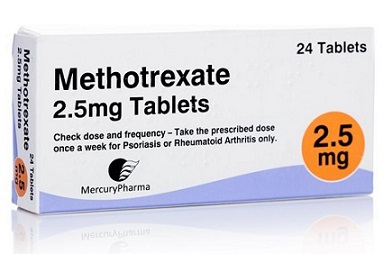COVID-19 Drugs: Study Indicates That DHFR Inhibitors Such As Methotrexate, Pralatrexate, Trimetrexate Can Be Repurposed As SARS-CoV-2 Antivirals
COVID-19 Drugs - Methotrexate, Pralatrexate, Trimetrexate Apr 07, 2023 2 years, 6 days, 11 hours, 49 minutes ago
COVID-19 Drugs: Since the outbreak of the COVID-19 pandemic, the scientific community has been tirelessly working to find effective therapeutic strategies to treat SARS-CoV-2-induced respiratory disease. Repurposing approved drugs has emerged as the most rapid, affordable, and efficient strategy for addressing this urgent need. Among the drugs tested for repurposing, methotrexate (MTX), a widely used chemotherapy and immunosuppressant drug, has shown antiviral effects against SARS-CoV-2.

In a new study by researchers from Italy and Germany, the antiviral activity of several dihydrofolate reductase (DHFR) inhibitors, including pralatrexate (PTX), trimetrexate (TMX), aminopterin, MTX, pemetrexed, and raltitrexed were explored against SARS-CoV-2 and their mechanisms studies.
Repurposing DHFR Inhibitors for COVID-19 Treatment
DHFR inhibitors are a class of drugs that inhibit the enzyme DHFR, which is involved in the de novo synthesis of nucleosides required for nucleic acid production. This class of drugs has shown anti-metabolic and anti-inflammatory effects, which led to the hypothesis that they could be used for COVID-19 treatment.
Furthermore, some DHFR inhibitors, such as MTX, have been found to regulate the activity of Angiotensin Converting Enzyme 2 (ACE2) and the interaction of a human helicase with Spike (S) and Transmembrane Serine Protease 2 (TMPRSS2), suggesting that they may interfere with viral entry and replication by targeting host proteins.
In this new research, the
COVID-19 Drugs study team observed that PTX and TMX demonstrated superior antiviral effects against SARS-CoV-2 compared to other DHFR inhibitors.
Their study findings indicate that the higher antiviral activity of these compounds is due to their polypharmacological and pleiotropic profile, which involves inhibiting virus entry, replication, and metabolism.
Mechanisms of Action of DHFR Inhibitors
To better understand the molecular mechanisms underlying the antiviral effects of DHFR inhibitors, the study team employed the EXSCALATE platform for in silico molecular modeling.
The researchers identified potential targets of MTX, PTX, and TMX and experimentally demonstrated the inhibition of NSP13 helicase as a new target for mediating the superior antiviral activity of these DHFR inhibitors.
Additionally, the study team found that these inhibitors influence viral entry through a common mechanism, and that TMPRSS2 is an additional target protein inhibited by the most effective PTX.
Clinical Implications and Future Directions
Given the strong, pleiotropic antiviral activity of PTX and TMX, these compounds could offer a clinical advantage in managing SARS-CoV-2 infection-associated complications in patients already treated with this class of drugs. Patients with cancers or autoimmune diseases who are treated with these drugs are often immunocompromised, cannot undergo vaccination, or are at a higher risk of insufficient immune response after vaccines and developing severe COVID-19 disease. In this context, treatment with DHFR inhibitors with s
trong antiviral activity and better safety profiles, such as PTX and TMX, can be advantageous for controlling both the primary disease and COVID-19.
Conclusion
In conclusion, the study findings highlights the importance of repurposing studies and the synergy between in silico and experimental approaches as powerful methods for generating effective responses to untreatable diseases. The study demonstrated that PTX, TMX, and MTX exhibit stronger antiviral effects against SARS-CoV-2 than other DHFR inhibitors, and that their higher efficacy is due to their pleiotropic inhibitory activity on cell metabolism as well as both viral entry and replication mechanisms.
These study findings have significant implications for the management of SARS-CoV-2 infection-associated complications in patients affected by chronic diseases who are already treated with this class of drugs.
Furthermore, the study findings emphasize the value of interdisciplinary approaches in drug discovery, combining in silico studies with in vitro and in vivo experiments to obtain a comprehensive understanding of the mechanisms underlying the antiviral activity of DHFR inhibitors. This approach not only provides insights into the molecular targets and pathways affected by these drugs but also offers a rationale for their potential clinical use in the context of the COVID-19 pandemic.
Future research could expand on the findings of this study by investigating other DHFR inhibitors with potentially similar antiviral properties, exploring additional molecular targets and mechanisms, and conducting clinical trials to assess the safety and efficacy of PTX, TMX, and MTX in patients with COVID-19. Moreover, the pleiotropic nature of the antiviral activity of these compounds could be further investigated in other viral infections, potentially leading to new therapeutic strategies for a wide range of diseases.
In summary, the identification of the antiviral potential of DHFR inhibitors, such as PTX, TMX, and MTX, offers new avenues for the treatment of SARS-CoV-2 infection and highlights the importance of drug repurposing and interdisciplinary approaches in addressing pressing medical challenges. As the scientific community continues to search for effective treatments for COVID-19 and other emerging viral diseases, the lessons learned from this study could be invaluable in guiding future research and clinical practice.
The study findings were published on a preprint server and are currently being peer reviewed.
https://www.preprints.org/manuscript/202304.0082/v1
For the latest on
COVID-19 Drugs, keep in logging to Thailand Medical News.
Read Also:
https://www.thailandmedical.news/news/u-s-medical-news-america-facing-a-severe-shortage-of-various-cancer-drugs-including-methotrexate,-cisplatin,-and-fluorouracil-many-americans-will-die
